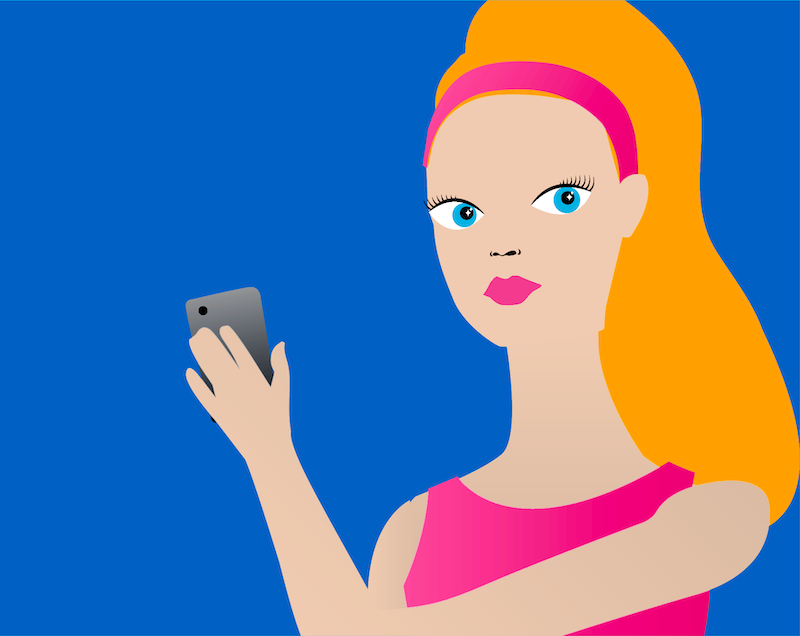Tia Laury is a freshman journalism major at MU. She is an opinion columnist who writes about racial, societal, relationship and personal matters for The Maneater.
The word pretty is one of the most powerful words in America’s vocabulary that individualizes people, especially females into categories based upon appearance. It’s an adjective with so much meaning that could either uplift or destroy a person’s ability to see the beauty that’s within them. In my eyes, it’s a beautiful lie.
I spoke with freshman Nyah Evans, and she believes the idea of being pretty is subjective to the individual. When it comes to women in America, there is a stigma that having a slim waist, lighter-colored eyes, nice face and fine hair collectively makes a person appealing to the eye. However, from my interview, as a mixed female with curvy features and darker skin, Nyah subdues the stereotypical beauty standard.
Over time, society’s idea of attractiveness has transformed into something that seems far-fetched.
Some women are tall and pencil-thin, while others are hourglass-shaped. Different ethnicities have different beauty standards and others are only subjected to beauty in a certain context, such as advertisements primarily targeted to multicultural females.
In a research paper, Skidmore College student Kristen Marrinan mentioned that in America, being light-skinned, blonde and blue-eyed is the typical beauty standard of what is most desirable. Some people are blindsided by what qualifies as attractive, especially when that is not obtainable for every woman. Particularly for females, there are many varieties of beauty that are overlooked because of the close-minded norm of who falls into the criteria.
Even though diversity is becoming more abundant, there is still a lack of women of color broadcasted, such as in the beauty industry. In a Marketing Week Article, beauty guru Florence Adepoju noted the lack of makeup choices for dark-skinned women like herself. It is a hassle for women of darker complexion to find products suitable for them because of the little recognition they have in the industry. A lot of what is shown to the public has to do with if the audience will like what they see, which struggles to fit in with multicultural women. Our society fails to consider more diversity because people of color are not commonly represented in the beauty industry.
On social media applications, such as Instagram, TikTok and Snapchat, girls showcase themselves to appeal to the eyes of others who can judge if they are pretty enough. Many influencers are white because they have been the desired beauty standard for many years. Their bodies: slim, lightly pigment, colored eyes and fine hair surpasses many other women with more defined features.
However, not every female upholds this stereotype of beauty. Some embrace their stretch marks or curvy body, while others hide their true appearances. Whether that be by photoshopping out a pimple or posing with a full face of makeup; many females are influenced by other pretty girls because they want to fit into societal norms of attractiveness. Many females gear toward a fantasized sense of beauty because it has been the norm of our society: covering up one’s identity to fulfill the wants of others.
Many young girls are influenced by women older than them on social media because of the false reality of what is portrayed as pretty. Researcher Jasmine Fardouly at Macquarie University in Sydney, Australia said, “people are comparing their appearance to people in Instagram images, and they often judge themselves to be worse off.”
Social media is a prime source of how females view their own appearance, but what some tend to not understand is that being pretty doesn’t only mean being physically attractive. It’s also who you are as a person.
A girl can be pretty just by being nice, said the University of Tennessee in Knoxville freshman, Umeria Taylor. Sometimes all a person needs is a welcoming personality that puts a smile on another’s face. There is a lot of stigma around the idea that looks are all there is to a person. As a female myself, we tend to objectify ourselves based on appearance, which can be harmful to our perceptions.
Women of all shapes, sizes and colors are beautiful. Physical attractiveness should not objectify if a person is good enough or wanted in a society where unity is praised. There is a need to derive from false narratives, and one can start with changing the definition of pretty in our society.
Donation Link: The Maneater believes their readers should participate in women’s empowerment. Donate directly to the Women’s Global Empowerment Fund if you are able, thank you. Donate Now
Edited by Sarah Rubinstein | [email protected]














